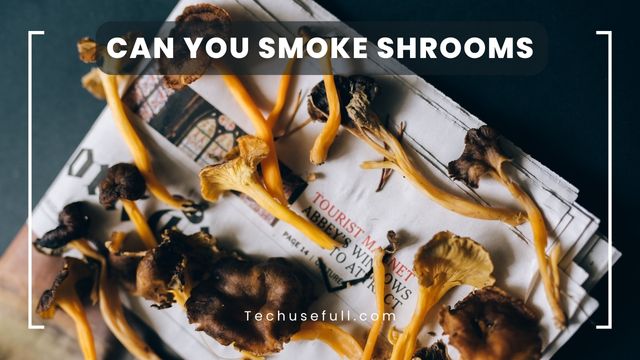Magic mushrooms, often called “shrooms,” have fascinated people for their ability to make you see and feel things differently. One question that comes up is, “Can you smoke shrooms?”
In this article, we will explore this question, find out what’s true and what’s not, and talk about better ways to use these mushrooms.
It’s important to clear up the confusion because magic mushrooms contain a strong substance called psilocybin.
Some experts are studying psilocybin to help with mental health problems like feeling very sad or anxious. So, getting the facts right about using magic mushrooms is not only important for your safety but also for helping scientists understand how they can help people.
Disclaimer
This article provides general information about the inhalation or smoking of mushrooms, particularly magic mushrooms (psilocybin-containing mushrooms).
We want to make it abundantly clear that we do not endorse or promote the inhalation or smoking of mushrooms or any other substances.
Our intention is solely to offer factual and objective information about this topic for educational purposes.
Why We Address Myths and Risks
Myth Dispel: Misconceptions and myths about the consumption of mushrooms, including smoking them, can lead to uninformed and potentially harmful decisions. We aim to dispel these myths with accurate information.
Safety Awareness: Understanding the actual risks associated with various consumption methods is crucial for individuals’ safety and well-being.
Promoting Responsible Discourse: In a rapidly evolving landscape of psychedelic research and changing legal perspectives, promoting responsible and informed discussions is vital. We encourage individuals to make well-informed choices while adhering to local laws and regulations.
Facts You Should Know Psilocybin And Magic Mushrooms?
Before getting into the details about smoking mushrooms, you should understand the critical nature of the content. Here are some relevant facts and figures related to psilocybin and magic mushrooms.
What is Psilocybin in Shrooms?
Psilocybin is a naturally occurring compound found in certain species of mushrooms, often referred to as “magic mushrooms” or “psilocybin mushrooms.”
Psilocybin is a psychoactive substance, which means it can alter perception, mood, and consciousness when ingested. When you consume magic mushrooms containing psilocybin, your body converts it into another compound called psilocin, which is responsible for the psychedelic effects.
Psilocybin and psilocin are classified as hallucinogenic or psychedelic substances because they can produce profound changes in perception, thought patterns, and sensory experiences. These effects can include hallucinations, alterations in time perception, and a sense of connection with one’s surroundings.
Psilocybin for Mental Health
Several studies have shown promising results in the use of psilocybin, typically not smoked but ingested, for treating various mental health conditions. For example, a study published in JAMA Psychiatry in 2016 found that psilocybin-assisted therapy reduced symptoms of depression and anxiety in patients with life-threatening cancer.
Global Legal Status
The legal status of magic mushrooms varies widely across countries and regions. For instance, in the United States, psilocybin is classified as a Schedule I controlled substance by the federal government, making it illegal. However, some cities and states have started to decriminalize or legalize its use for therapeutic purposes.
Risks of Smoking Mushrooms
Smoking mushrooms, in general, is not considered an effective or safe way to consume them. The heat from smoking can destroy the active compounds, making it less potent. Moreover, inhaling any substance through smoking can carry health risks, including damage to the respiratory system.
Efficacy of Ingestion
When ingested orally, magic mushrooms are typically more effective because the psilocybin is metabolized by the liver into its active form, psilocin, which is responsible for the psychedelic effects.
Is Smoking Shrooms Effective?

No, there is no scientific evidence that smoking shrooms produces the psychoactive effects associated with psilocybin, the active ingredient in magic mushrooms.
Here’s why:
Heat Sensitivity: Psilocybin, the active compound in magic mushrooms, is easily destroyed by heat.
Inefficient: Smoking mushrooms exposes them to high temperatures, causing the psilocybin to break down before it can work.
Wasteful: Smoking shrooms is a wasteful and ineffective way to consume them, as it ruins the psychedelic effects.
Potential Harm: Inhaling any substance through smoking can harm your respiratory system and overall health.
Effective Methods for Magic Mushrooms
To experience the effects of magic mushrooms safely and effectively, consider these methods instead of smoking.
Eating: Consume them raw or dried.
Eating magic mushrooms is a common and straightforward method. You can eat them as they are, either fresh or dried.
Drying mushrooms is a way to preserve them, and they can still be eaten to achieve the desired effects.
Tea: Make mushroom tea
Making mushroom tea involves steeping magic mushrooms in hot water to create a brew. This method is favored by some because it can be gentler on the stomach compared to consuming them directly.
The effects often come on more gradually, and the taste is milder than eating the mushrooms.
Incorporate into Food: Mix them with food
Another approach is to mix magic mushrooms into food or beverages. You can grind them into a powder and add them to recipes like pasta sauce or mix them into a smoothie.
This method can help mask the taste and make consumption more palatable for some people.
What Happens When You Smoke Shrooms?
Have you ever wondered what smoking shrooms does? Well, there’s not much research on it. People who’ve tried it and shared their experiences on forums or places like Reddit have mixed stories.
Some say it gives a mild high, but it’s nothing like the strong affects you get from eating or making tea with shrooms.
But here’s the catch: most folks find it doesn’t do anything at all, except maybe make them feel a bit sick. The problem might be the heat from smoking, which can break down the main thing in shrooms that makes you trip, called psilocybin.
We have consulted few doctors to know facts. Following we are listing few side affects you may face.
Side effects when you smoke shroom?
When you smoke mushrooms, particularly magic mushrooms (psilocybin-containing mushrooms), you may experience various side effects, although this method of consumption is generally discouraged due to its inefficiency and potential risks. Some of the potential side effects when smoking shrooms may include:
- Coughing
- Chest irritation
- Bronchitis
- Pneumonia
- Lung cancer
- Increased risk of heart disease
- Stroke
- Addiction and dependence
- Anxiety
- Panic attacks
- Hallucinations
- Delusions
- Paranoia
- Psychosis
If you are considering smoking shrooms, we urge you to reconsider. There are safer and more effective ways to consume them, such as eating them or drinking them in a tea.
Please note that we are not endorsing the use of shrooms. However, we believe it is important to provide accurate information about them so that people can make informed decisions.
Bottom line
While it’s technically possible to smoke shrooms, it’s not an effective method if you’re seeking a psychedelic experience. There’s no scientific evidence to suggest that smoking shrooms produces the desired psychoactive effects associated with psilocybin. Inhaling any kind of smoke is harmful to your health, so it’s best to explore alternative consumption methods for magic mushrooms.
If you’re concerned about your substance use and seeking help, you have several options:
- Speak with your primary healthcare provider (they are bound by patient confidentiality laws and won’t share this information with law enforcement).
- Contact SAMHSA’s national helpline at samhsa.gov @ 800-662-help (4357) or use their online treatment locator.
- Explore support groups through the Support Group Project.


